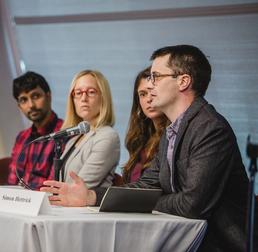Seminar 28th November 2016 10 a.m. 176/2013
NGCM Seminar - How Research Software Engineers will save research
Dr Simon Hettrick
The Software Sustainability Institute
- Categories
- NGCM, Software Engineering
- Submitter
- Susanne Ufermann Fangohr
Summary
Almost 70% of researchers report that software is fundamental to their research, yet most researchers do not have access to people with software engineering skills. The importance of software to research is only going to increase, so the academic community must find a way of getting the help they need to write reliable and reproducible software - and hence producing reliable and reproducible results.
One solution lies in training researchers, but researchers are already over-burdened and there is a limit to the number of skills that any one person can master. What's more, researchers tend to become researchers because they want to conduct research... not software engineering. A better solution is to ensure that researchers can get help from people who understand both research and software engineering. We call these people "Research Software Engineers", and since 2013 we have been campaigning to gain recognition for this new role in academia. We have presided over the growth of a community that is now over 700 strong, seen the foundation of new groups across UK academia and recently held the first conference for Research Software Engineers which attracted people from 14 different countries. In this talk, I will discuss why academia needs Research Software Engineers, will discuss the challenges of setting up a new national community, and will present results about the successful growth of this important community.
Biography
Simon Hettrick is the Deputy Director of the UK's Software Sustainability Institute. He is responsible for the Institute's policy team which investigates the use of software in the research community and campaigns for changes that will improve the software that is used in research. He has a particular interest in the people who develop software in academia - Research Software Engineers - and has been a passionate advocate for greater recognition and reward for this group.
Before working for the Institute, Simon conducted research into waveguide lasers, worked as a patent attorney and then moved into communications. He still considers himself a physicist, but can no longer do maths.
